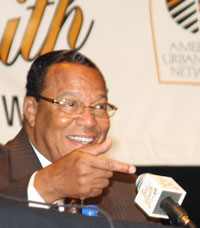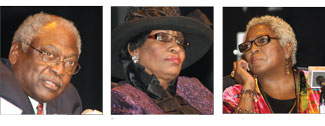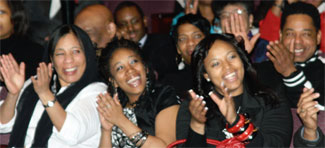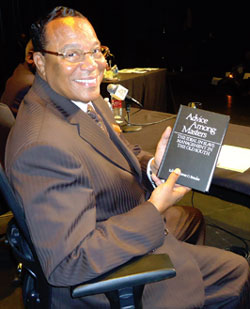PITTSBURGH (FinalCall.com) – The Honorable Minister Louis Farrakhan’s clarion call for Black empowerment and self-determination rang out across America during a nationally broadcast town hall meeting at the August Wilson Center for African American Culture here March 11.

Despite the attempts of critics seeking to influence and divide Pittsburgh’s Black community, Minister Farrakhan joined popular and principled syndicated talk show host Bev Smith for an important 3-hour conversation with concerned residents to discuss “The Disappearing Black Community and How We Can Get It Back.”
“Up you mighty people! Up you mighty people! Up you mighty people!” said Ms. Smith, reminding those listening that Blacks are the descendents of those who survived slavery and built this country. “They cannot keep us down! The only thing keeping us down is us–and I’ve paid too much of a price for you to be here tonight,” she told the standing room only crowd prior to going live on air. The American Urban Radio Network hostess’ meeting was broadcast over WGBN-AM radio and carried live over the Internet at http://www.wgbn.net/.
During the days prior to the event, Ms. Smith received calls from Jewish and Christian leaders expressing their displeasure at her decision to invite Min. Farrakhan to participate in the event. Several writings appeared in the Pittsburgh Jewish Chronicle repeating the thoroughly discredited, yet oft-repeated claims of Minister Farrakhan’s “anti-Semitism.”

Though saddened by the unnecessary controversy fomented by those determined to make mischief, Minister Farrakhan was unapologetic in his delivery of a clear message as a warner from God.
“I love the truth and I love you and I refuse to compromise my principles to get along,” said Min. Farrakhan. “My love of God makes me put my trust completely in Him.”
The outside pressure proved to be too much for Melanie Campbell, president and CEO of the National Coalition on Black Civic Participation. She backed out just days before the town hall meeting fearing the loss of future funding, according to Ms. Smith.
Undeterred, Minister Farrakhan was joined by Rep. James Clyburn, (D-S.C.) and longtime civil rights activist and radio host Dorothy Tillman, who gladly paid her own way and stepped in to fill the slot vacated by Ms. Campbell.
During his message of guidance, which set the tone for the event, Minister Farrakhan touched on issues plaguing Black communities: joblessness, poor education, terrible health, disunity, and moral depravity. All of these maladies contribute to a community that in medical terms would be described as having “flat-lined.”
“Our problem is our fear–not White people–but our fear of them which makes us act in a manner that is less dignified and less character building and instead of passing on a future to our children oft-times we pass on the legacy of our cowardice and we refuse to confront evil wherever evil is,” said Min. Farrakhan.
Regarding the scorn and abuse he has received as an outspoken and public Black leader over the years, Min. Farrakhan said it is the price that must be paid for representing truth.

“No man wants to be rejected. No man wants to be despised. No man or woman wants to be evil spoken of. No man or woman wants to be viciously reviled. But Jesus said, ‘blessed are ye, when men shall revile you.’ I am a reviled person. I am persecuted–not because I killed somebody, not because I robbed somebody, not because I raped somebody, because I dare to stand like a man and tell the truth!” he said.
The Minister also spoke at length regarding a critical event in the history of Black people in America, “The Compromise of 1877.” Despite its major impact on conditions Blacks faced then and still face today, many know nothing about it. Much of this information is contained in “The Secret Relationship Between Blacks and Jews” Volume Two,” the Minister said.
In the days leading up to the event, Ms. Smith received death threats at her home, and there was even a bomb threat at the August Wilson Center just hours before the event.
Yet she never considered calling it off or changing her plans for the event.
Furthermore, Blacks never insert themselves into the affairs of other ethnic groups to tell others what to discuss and with whom their issues should be discussed, she noted.
“We have endured White-only signs from the time we came here and when we finally sit down and say it’s time for us to talk about us, there is a problem! We are not going to talk about their problem tonight, that is their problem not ours,” said Ms. Smith. “I do not have to prove that am not anti-Semitic, but what I do have to prove is that I am for my people all of the time no matter what time, no matter what circumstances and I will give my life so that my people will be free! I want freedom!”
In a typical present day example of the historically arrogant and paternalistic manner with which members of the Jewish community have treated Black leaders and organizations, Rabbi Abraham Cooper, associate dean for the Los Angeles-based Simon Wiesenthal Center, wrote an opinion piece appearing in the March 11 edition of the Pittsburgh Post-Gazette saying Min. Farrakhan’s inclusion in the forum “bestows on him unwarranted credibility.” Additionally, Rabbi Cooper–in what some Pittsburgh residents considered a veiled threat–said Rep. Clyburn, a publicly elected official and highly ranked member of the Democratic Party, should follow Ms. Campbell’s lead and withdraw from the event.

Pittsburgh residents clearly ignored the critics, and Rep. Clyburn told The Final Call, he was “not bothered in the least bit” by those criticizing him for appearing at the event. The venue was completely full with an overflow room set up to allow others to hear the discussion.
Nation of Islam representatives from the East Coast traveled to Pittsburgh to witness the event, and dozens of members of the Fruit of Islam, Muslim men, and Muslim women were on hand to bolster the center’s security for the event. Though there were rumors of possible protests, none materialized.
“I want to thank Min. Farrakhan for offering up a number of precepts that we ought to adhere to,” said Rep. Clyburn, after the Minister Farrakhan made remarks about the critical need for Blacks to unite, pool their resources and build for a future.
The best lessons are taught by example, and what needs to happen is that once individuals are inspired, they should move forward in making a vision a reality, said Rep. Clyburn.
Rep. Clyburn also talked about the respect for women, saying no one should call a woman a name they wouldn’t want their mother or daughter called.
Coming from a strong line of Black women who faced down racists of the Ku Klux Klan in the south, Ms. Tillman paid her own way and gladly stepped in after the other panelist backed out.
Holding up a book titled “Advice Among Masters: The Ideal in Slave Management in the Old South” by James O. Breeden, Ms. Tillman said today, leaders are needed who are not afraid to publicly say they are interested in building the Black community.
Giving historical examples of Black Wall Street in Tulsa, Okla., and Rosewood, Fla., where Whites destroyed vibrant Black communities, she said Whites become scared when it appears that Blacks are building economic power.
“There’s always been a move to hold us down,” said Ms. Tillman who was amongst the Black women who Min. Farrakhan said “lambasted” the Rev. Jesse Jackson into supporting the 1995 Million Man March. Min. Farrakhan also paid tribute to the strength of the late Dr. Dorothy Height, of the National Council of Negro Women, who despite critics strongly supported the Million Man March.
All of these things are part of the experiences that make up the cultural fabric of the Black community, said Min. Farrakhan.
Jewish critics and opposition
Since nothing happens except by the active or permissive will of God, Min. Farrakhan pointed out that suffering is a part of life. Since God is the ultimate cause of all effect, as the Jewish people look to the holocaust to guide and motivate them, they should not focus on Hitler so much, but instead, ask God why he permitted the tragedy. Likewise, Black people should look at the trans-Atlantic slave trade, study it carefully, and ask God in the proper spirit why he permitted it, said Min. Farrakhan.
His words were a lead into his discussion of a controversy with a small yet influential group within the American Jewish community.
Regarding Jewish critics who have denounced him over the years, as well as the book “The Secret Relationship Between Blacks and Jews,” the Minister said, “Don’t judge me by what they write.”
“They have not produced one that has defeated me and the more I defeated them and stood up and would not bow down, Black people saw me as a champion and a fighter,” Min. Farrakhan noted. “Now, this book has them so upset that they would call this a pack of lies and hateful anti-Semitic stuff because now, truth is getting out and I might be a soloist today, but an ensemble is brewing and before you know it, there will be an international choir singing against you.”
Pressure put on August Wilson Center
In 2010, the August Wilson Center for African American Culture formed a partnership with American Urban Radio Networks and their nationally syndicated program, The Bev Smith Show, to host four town hall meetings.
The theme of the meetings is “The Disappearing Black Community and How We Can Get it Back.”
The first was held in November 2010, and March 11 was the second gathering.
Ms. Smith told The Final Call the next scheduled town hall meeting will deal with the Black church and she plans to invite Rev. Jeremiah Wright.
André Kimo Stone Guess, the center’s president and CEO, stood firmly on the decision to honor the agreement with American Urban Radio Networks and The Bev Smith Show amid pressure from local and national Jewish leaders.
“An open and honest dialogue on this subject is well within the Center’s mission and strategic thrust to work concentrically (from local to regional to national and international) and collaboratively to preserve, present, interpret celebrate and shape the art, culture and history of African Americans,” said Mr. Guess in a statement. “American Urban Radio Networks and The Bev Smith Show have complete editorial control over the program and its content. As such, they choose and invite the guests and panelists.”
Despite wishing there was more time, Ms. Smith told The Final Call she had no complaints. She expressed thanks to God that people were able to hear from a man of strength in Minister Farrakhan. She said the criticism made her angry, but she never considered backing down.
“It only made me angry, because I am really tired of the slave mentality. I’m tired of the slave master still thinking he has a right to tell the slaves who, what, when, where, and why, and I will never give up!”
Ms. Smith said she invited Minister Farrakhan and Rep. Clyburn because “the traditional voices are co-opted” and that the threats did not rattle her. Faith in God and a desire to represent the truth keeps her protected, said Ms. Smith.
“Honey, I’ve been shot at before. I’ve marched against the Ku Klux Klan before, and my daughter’s school was threatened and I had to have the FBI for six weeks put the key in my door here in Pittsburgh because I went into the prisons and talked about how White prison guards were treating Black inmates. I had my car stolen, I was shot at, and the hole is still in the window at the old radio studio–but do you see me?”
During his closing comments, Minister Farrakhan made sure that it was clear that the Nation of Islam had Ms. Smith’s back and that he will continue to speak with the strength of one with divine backing of God. He also demanded that the Black residents of Pittsburgh and across the country ensure that strength she has displayed during this ordeal is reciprocated.
“Bev Smith is such a strong sister, and she needs your support right here in Pittsburgh, so we have to make sure that no harm or hurt comes to her or to the radio station for her strength. And we have to pledge when you see strength like this, always support her and let the opposition know that no harm is coming to our sister in this city or any other city,” said Min. Farrakhan. “And don’t fear for me because I speak like this. Don’t be afraid. I am telling you from my mouth–they killed their last prophet when they killed Jesus. I’m telling you my life is not going to be taken and if you doubt then all of you that have power, come and take it from me and I guarantee you, you will be the one losing yours!”
Reactions to town hall meeting
Pittsburgh resident Monica Harvey, who also lived for a time in Washington, D.C., came to the town hall because she admires the work of Bev Smith and is concerned about issues facing the Black community. Minister Farrakhan’s words about the breakdown of the Black family touched her deeply.
“I know so many African-American women who are gainfully employed and they are taking care of the household, and for reasons that may or may not be his fault, the man is not,” said Ms. Harvey. “I wanted to hear a good discussion about the Black community, and I am not disappointed.”
“Minister Farrakhan has launched a new era in our struggle for freedom, justice and equality. The clarity with which our history has finally been presented is palpable. It has created energy in the people that I have never witnessed before,” said Atty. Ava Muhammad, author and top aide to Minister Farrakhan, referring to “The Secret Relationship Between Blacks and Jews,” Volume Two, which was referred to by Min. Farrakhan several times during the event.
“There are two major things about the Jesus of the Bible that tell us that in Minister Farrakhan we have the Jesus of today: Number one, the controversy with the Jews and number two, the women. Here again it was a woman, just like during the Million Man March, it was Dorothy Height with the Million Man March and tonight, it was Bev Smith. The argument that Bev Smith presented to Jewish leadership that opposed Minister Farrakhan’s coming really should be studied by Black leaders, because the issue is not what the Minister has said, the issue is that we have a right to conduct our own affairs without interference,” Atty. Ava Muhammad added.
Student Minister Rodney Muhammad, the Delaware Valley regional representative of the Nation of Islam based in Philadelphia, was also on hand for the event. It is clear that Minister Farrakhan is placing a special emphasis on the relationship between the Black and Jewish community, which is discussed in the book, he said.
“I just go back to something he said, ‘unless you can expose a plant by its root, you can’t destroy it.’ We have no other choice but to expose this horrible secret. Without its exposure Black people will never be free in this country,” said student Minister Rodney Muhammad.
“It has been an amazing day and this is exactly what our community needs, right guidance coming from the Honorable Minister Louis Farrakhan and the strong words of Ms. Tillman,” said Student Minister Jasiri X, who leads Pittsburgh’s Muhammad Mosque No. 22. “I am totally blown away and thankful that Bev Smith stood strong, and invited God’s man in our midst to give us what will heal our ills–the truth.”












